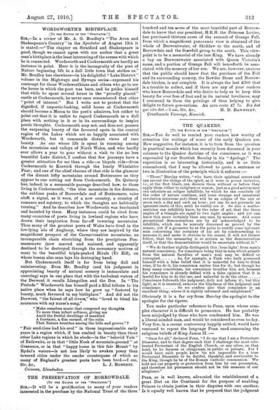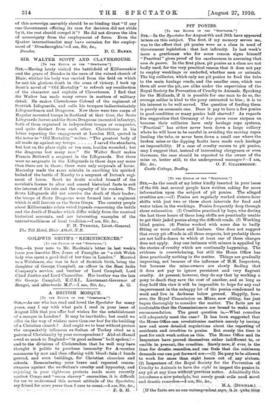THE QUAKERS.
[To THE EDITOR OF THE " SPECTATOR:]
SIR,—You do well to remind your readers how worthy of attention the writings of some of the early Quakers are. How suggestive, for instance, it is to turn from the question in practical morals which has recently been discussed in your columns to the Quaker doctrine of the conscience, as it was expounded by our Scottish Barclay in his "Apology." The exposition is so interesting historically, and is so little remembered, that I may be allowed to quote a sentence or two in illustration of the principle which it enforces :—
" Those," Barclay writes, "who have their spiritual senses and can savour the things of the spirit, as it were in prima instantia, i.e., at the first blush, can discern them without or before they apply them either to scripture or reason; just as a good astronomer can calculate an eclipse infallibly, by which he can conclude (if the order of nature continue, and some strange and unnatural revolution intervene not) there will be an eclipse of the sun or moon such a day and such an hour ; yet can he not persuade an ignorant rustic of this, until he visibly see it. So also a mathe- matician can infallibly know, by the rules of art, that the three angles of a triangle are equal to two right angles ; and yet can know this more certainly than any man by measure. And some geometrical demonstrations are by all acknowledged to be infallible, which can be scarcely discerned as proved by the senses ; yet if a geometer be at the pains to certify some ignorant man concerning the certainty of his art by condescending to measure it, and make it obvious to his senses, it will not thence follow,, that the measuring is so certain as the demonstration itself, or that the demonstration would be uncertain without it."
"We do further rightly distinguish this [true light] from man's natural conscience; for conscience being that in man which ariseth from the natural faculties of man's soul may . be defiled or corrupted As, for example, a Turk who hath possessed himself with a false belief that it is unlawful for him to drink wine, if he do it, his conscience smites him for it; but though he keep many concubines, his conscience troubles him not, because his conscience is already defiled with a false opinion that it is lawful for him to do the one, and unlawful to do the other Conscience followeth the judgment, doth not inform it ; but this light, as it is received, removes the blindness of the judgment and conscience So we confess also that conscience is an excellent thing, where it is rightly informed and enlightened."
Obviously it is 'a far cry from Barclay the apologist to the apologist for the tipster.
You make particular reference to Penn, upon whose com- plex character it is difficult to pronounce. He has probably. been misjudged by those who have condemned him. He was. a liberal-minded man, and would be considered so even to-day Very few, in a recent controversy happily settled, would have. ventured to repeat the language Penn used concerning the religious beliefs of King James II. :— " Once for all,". declared Penn, "I do say that I am a Protestant Dissenter, and to that degree such that I challenge the most cele- brated Protestant of the English Church, or any other, on that head, be he layman or clergyman' in public or private.. For I would have such people know 'tis not impossible for a true Protestant Dissenter to be dutiful, thankful, and serviceable to the King, though-he be of the Roman Catholic - communion.' We hold not our property or protection from him by our persuasion, and therefore his persuasion should not be the measure of our allegiance."
Penn, as is well known, advocated the establishment of a. great Diet on the Continent for the purpose of enabling Princes to obtain justice in their disputes with one another.. Is it equally well known that he proposed that the judgment
of this sovereign assembly should- be so binding- that "If any one Government offering its case for deciaion.did not abide by it, the rest should compel it"? He did not divorce the idea -of sovereignty from the employment of force. Even the Quaker internationalist may have occasion for the employ- anent of • Dreadnoughts?-1. am, Sir, Sm., Dundee. D. C. BANKS.







































 Previous page
Previous page